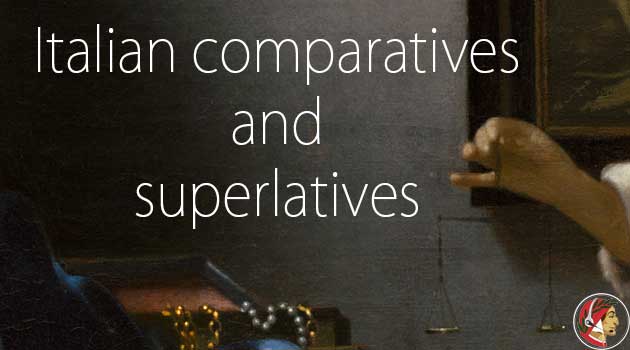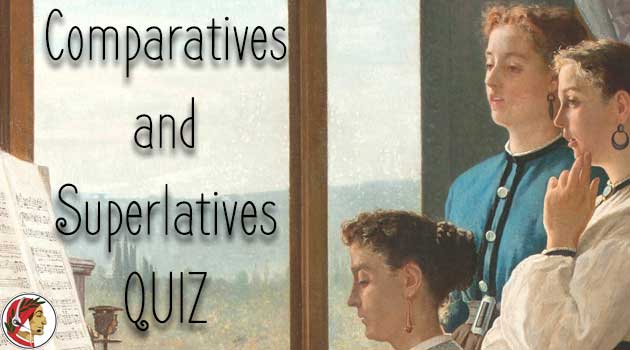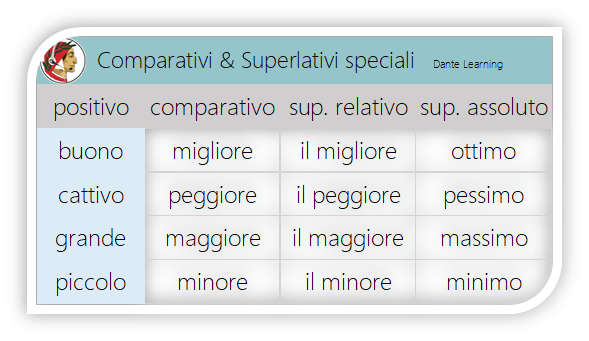With Italian comparatives and superlatives we can express the intensity of an adjective or an adverb by making a comparison. Learn the Comparativi e Superlativi
We can sort and analyse Italian Comparatives and Superlatives according to their function. We can start with comparatives, or comparativi.
Comparativo di uguaglianza
We can compare two elements with the same relative importance using come or quanto (‘as . . . as’) . We can also use the words tanto … quanto, altrettanto or così before the first element and make the comparison stronger.
- La mia nuova macchina è tanto veloce quanto quella di prima. My new car is as fast as the one I had before.
- La mia amica Laura è tanto bella quanto simpatica. My friend Laura is as pretty as nice.
- In Italia la birra non è popolare come in Germania. In Italy, beer is not as popular as in Germany.
Comparativo di maggioranza / minoranza
The words più (‘more’) and meno (‘less’) are used to turn an adjective (aggettivo) into a comparative. We use the words di or che (‘than’) for introducing the second element of the comparison:
- La Ferrari è più cara della Porsche. Ferrari is more expensive than Porsche.
- Venezia è meno grande di quanto pensassi. Venice is less big than I thought.
- È più facile leggere che parlare in Italiano. It is easier to read than speaking Italian.
- Fabio è più intelligente che forte. Mario is more intelligent than strong.
The choice of DI or CHE is quite tricky, sometimes not linear in spoken Italian. There are more complex rules, which depend on the elements that you are comparing (two verbs or two nouns etc…). A simple rule of thumb that works pretty flawlessly is:
- Compare two separate elements: DI.
Mario è più ricco di Stefano.
- Compare two elements of the same subject: CHE.
Mario è più simpatico che intelligente.
- Compare two actions. CHE
Leggere è più rilassante che guardare la tivù.
- La vita è più cara a Milano che a Napoli.
- Monica è meno professionale di Laura.
Special comparatives
Four very common adjectives have a special form of comparative:
- buono —-> migliore (più buono)
- cattivo —-> peggiore (più cattivo)
- grande —->maggiore (più grande)
- piccolo —->minore (più piccolo)
Regular and irregular comparatives in the third column are are both correct. Please note that:
- Maggiore can mean ‘bigger, older/elder’ ‘greater’.
- Minore can mean ‘smaller’ or ‘younger’, ‘less, the lesser’.
For example
- Ho due figli. Il maggiore si chiama Luciano, il minore Davide.
A last important note: better and worse are meglio and peggio. They are adverbs, but we can use them as adjectives as well. For example:
- Stefano cucina meglio di Mario.
- Io parlo il giapponese peggio di te.
ma anche:
- Milano è meglio di Torino.
- Non lavorare è peggio che avere un brutto lavoro.
The second element of the Italian Comparatives and Superlatives are the superlativi. We can subdivide them in different categories for understanding better how they behave in a sentence.
Superlativi relativi
When something or someone has ‘the most’, the highest (or lowest) degree of a certain quality, in a specific context, we use il più or il meno together with the relevant adjective. This is a relative superlative, in Italian superlativo relativo:
- Serena è la ragazza più bella del paese.
- Giuseppe Verdi è stato il più grande compositore Italiano.
- Il Monte Bianco è la montagna più alta d’Italia.
- Dario è il giocatore meno alto della squadra di basket.
Again, a few common adjectives have a special form of relative superlative, as well as the regular one:
- il migliore (il più buono)
- il peggiore (il più cattivo)
- il maggiore (il più grande)
- il minore (il più piccolo)
- Il prosecco è il migliore vino bianco italiano.
Superlativi assoluti
Indicates a very high or low degree of a certain quality in absolute terms, without any comparison. The easiest way to form a superlativo assoluto starting from an adjective is by adding the suffix -issimo or the feminine / plural declination.
- Alberto è un ragazzo intelligentissimo.
- Claudia viene da una famiglia ricchissima.
- Le tue sorelle sono simpaticissime.
- A casa mia ci sono dei mobili antichissimi.
Alternatively, we can add the adverb molto, estremamente, decisamente or assai (obsolete in spoken Italian) to the adjective and obtain:
- … molto intelligente
- … estremamene ricca
- … decisamente simpatiche
- … assai antichi
Sometimes, we can transform an adjective into an absolute superlative doing the following:
- adding an adjective having the same/similar meaning: bagnato fradicio.
- duplicating the adjective: facile facile.
- adding bello instead of molto in the spoken language: bello contento.
- adding il/la/i/le più … Flavia è la più bella (di tutte, implying “of all”)
The usual four adjectives have also irregular absolute superlatives.
- buonissimo/ottimo
- cattivissimo/pessimo
- grandissimo/massimo
- piccolissimo/minimo
A common mistake: we can’t turn a superlative into a “superlative-superlative”. In other words, expressions like “il più buonissimo” are wrong.
I hope this recap was useful for understanding the Italian Comparatives and Superlatives.
Please try the quiz. Alla prossima.
LOADING QUIZ...




